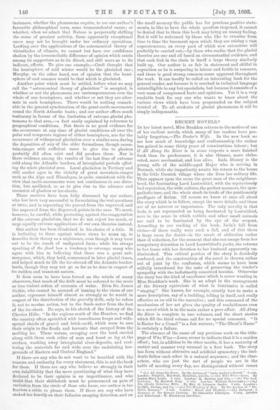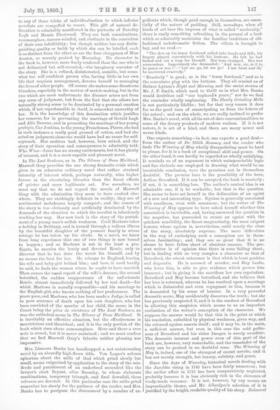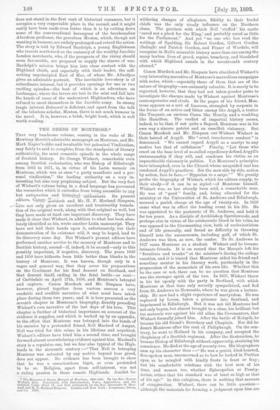RECENT NOVELS.* IN her latest novel, Miss Braddon returns to
the motive of one of her earliest novels, which many of her readers have pro- bably forgotten,—The Doctor's Wife. In the new book we see how much of knowledge and craftsmanship the author has gained in some thirty years of conscientious labour ; but if All Along the River is in some respects a more finished book than its predecessor, it is also thinner, more elabo- rated, more mechanical, and less alive. Isola Disney is the young wife of the middle-aged Major who is serving in Burmah, while she impatiently awaits his return to the house in the little Cornish village where she lives her solitary life. Then appears upon the scene the great man of the neighbour- hood, the fascinating Lord Lostwithiel, with the mysteriously bad reputation, the wide culture, the perfect manners, the sym- pathetic tone, and the whole stock-in-trade of the gentlemanly profligate of fiction. Of course we know at once all about the story which is to follow, except the mere details, and these are of no interest or importance. The only novelty is that Isola is not represented as being fascinated by Lostwithiel, save in the sense in which rabbits and other small animals are said to be fascinated by the eye of the serpent. According to our reading of the book, Isola's fall from virtue—if there really were such a fall, and of this there is large room for doubt—is the result of abduction rather than of seduction, for the moment that she can escape from her compulsory detention in Lord Lostwithiel's yacht, she returns to her home with her devotion to her husband apparently un- diminished. This critical portion of the story is decidedly confused, and the construction of the novel is thrown rather out of joint by the confusion, which seems to have been wilfully introduced for the sake of preserving the reader's sympathy with the indistinctly conceived heroine. Otherwise the story has the kind of excellence which is never wanting in Miss Braddon's work. She is an adept in the management of the literary equivalent of what in histrionics is called " staging." She knows, for example, exactly how to make a mere description, say of a building, telling in itself, and really effective as an aid to the narrative ; and this command of the mechanism of her art gives the quality of readableness even to a novel which is in the main rather a poor affair. All Along the River is complete in two volumes, and the short stories which fill the third volume call for no special comment. "It is Easier for a Camel" is a fair success; "The Ghost's Name" is certainly a failure.
The absence of the name of any previous work on the title- page of Who Wins—Loses, seems to indicate that it is a maiden effort ; but, in addition to its other merits, it has a maturity of matter and manner very unusual in a first book. The story has form without obtrusive and artificial symmetry ; the inci- dents follow each other in a natural sequence ; and the char- acters, who are just the sort of people we are in the habit of meeting every day, are distinguished without resort (1,) All Along the Riser. By the Author of " Lady Audley's Secret." 3 vols. London : Simpldn, Marshall, Hamilton, and 013.--(2.) Who Wins—Loess. By Sophia Mary Locke. 3 vols. London: H. Bentley and Son.— (3.) The Last Sentence. By Maxwell Gray. 3 vols. London William Heinemann.—(4.) The Slowly Grindinq Mills. By Mrs. G. Li1111133118 Banks. 3 vole. London Griffith, Farran, and Co,—(3,) The Winning of Mau. By the Author of Dr. Edith Romney." 3 vols. London : Huret and Blaokett.—(0.) Balmoral a Romance of the Queen's Country. By Alexander Allardyoo. 3 vols. London and Edinburgh W. Blaokwood and Sone. to any of those tricks of individualisation to which inferior novelists are compelled to resort. This gift of natural de- lineation is admirably manifested in the portraits of Dorothy Legh and Mamie Fleetwood. They are both conscientious, commonplace, narrow-minded, and obstinate in the conviction of their own infallibility; but though neither has any distin- guishing quality or habit by which she can be labelled, each is as distinct from the other as are the four clergymen of Miss Austen, so warmly praised by Macaulay. No character in the book is, however, more finely rendered than the one who is not delineated but self-revealed,—the imaginary narrator of the story. She is a refined, disinterested, amiable, but some- what too self-confident person who, having little in her own life that requires management, devotes herself to managing the lives of other people. Of course she makes some disastrous blunders, especially in the matter of match-making, but in the two which are most unfortunate the disaster arises not from any error of judgment, but from the fact that she allows her naturally strong sense to be dominated by a personal emotion which, if not reprehensible in itself, is somewhat unworthy of her. It is the knowledge of this domination which justifies her remorse, for in preventing the marriage of Gerald Legh and Alix Browne, and in promoting the marriage of her young protegee, Car Jenkins, to the young Frenchman, Pierre, she had in each instance a really good ground of action, and had she acted on judgment alone she would have had no cause for self- reproach. Her motives had, however, been mixed, and the story of their operation and consequences is admirably told. Who Wins—Loses has no strong excitements, but it has plenty of interest, and it is a most capable and pleasant novel.
In The Last Sentence, as in The Silence of Dean Maitland, Maxwell Gray provides the one strong dramatic crisis which gives to an otherwise ordinary novel that rather strained intensity of interest which, perhaps naturally, wins higher favour at the circulating libraries than the finest effects of quieter and more legitimate art. For ourselves, we must say that we do not regard the novels of Maxwell Gray with the admiration they seem to have excited else- where. They are strikingly deficient in reality; they are of sentimental melodrama largely compact ; and the course of the story is too obviously and artificially dominated by the demands of the situation to which the novelist is laboriously working her way. Her new book is the story of the punish- ment of a young man's selfish weakness. Cecil Marlowe takes a holiday in Brittany, and is nursed through a tedious illness by the beautiful daughter of the peasant family in whose cottage he has taken up his abode. In a novel, we know from long experience that one of two things is now bound to happen ; and as Marlowe is not in the least a pro- fligate, he marries the lovely and devoted Renee, only to discover that he has done the worst for himself, and by no means the best for her. He returns to England, leaving his wife and baby-girl behind him ; and here, it need hardly be said, he finds the woman whom he ought to have married. Then comes the usual report of the wife's decease, the second betrothal, the sudden reappearance of the unfortunate Renee, almost immediately followed by her real death—for which Marlowe is morally responsible—and his marriage to the English girl, who knows nothing of her predecessor. The years pass, and Marlowe, who has been made a Judge, is called to pass sentence of death upon his own daughter, who has been convicted of the murder of her child, the scene in the Court being the piece de resistance of The Last Sentence, as was the cathedral-scene in The Silence of Dean Maitland. It is inevitably an effective situation, but the effectiveness is meretricious and theatrical; and it is the only portion of the book which rises above commonplace. Here and there a true note is struck, but it is never sustained ; and we must confess that we find Maxwell Gray's falsetto neither pleasing nor impressive.
Mrs. Linnaeus Banks has handicapped a not uninteresting novel by an absurdly high-flown title. Von Logau's solemn aphorism about the mills of God which grind slowly but small, seems vulgarised by application to the story of the mis- deeds and punishment of an underbred scoundrel like the lawyer's clerk Bryant, alias Bromley, to whose elaborate machinations, temporary triumph, and final downfall, these volumes are devoted. In this particular case the mills grind somewhat too slowly for the patience of the reader, and Mrs. Banks has to postpone the denouement by a number of ex- pedients which, though good enough in themselves, are essen- tially of the nature of padding. Still, nowadays, when all kinds of art bear the impress of what is called "modernity," there is really something refreshing in the perusal of a book which so admirably maintains the familiar traditions of old- fashioned melodramatic fiction. The villain is brought to bay, and we read :- "The dew on his tense forehead rolled into beads and fells his fingers played convulsively with his buttons. He felt he had baited and sot a trap for himself. Her tone changed. She was remorseless. Imperiously she demanded : ' And now, sir, is it to
be peace or war ? Let me go, let me go ! I am faint and ill,' he answered evasively."
" Evasively " is good; so is the " tense forehead," and so is the convulsive play with the buttons. They all remind us of Bulwer Lytton's Night and Morning, and the serial stories of Mr. J. F. Smith, which used to thrill us in what Mrs. Banks would doubtless call "our boyhood's years ;" nor do we find the reminder wholly unpleasing. The Slowly Grinding Mills is not particularly lifelike ; but for that very reason it does for us the good turn of emancipating us from the fetters of the actual ; and on the whole, we are really inclined to prefer Mrs. Banks's novel, with all its out-of-date conventionalities, to some of the dreary products of modern realism. If it is not nature, it is art of a kind, and there are many newer and worse kinds.
One expects something—in fact, one expects a good deal— from the author of Dr. Edith Romney, and the reader who finds The Winning of May wholly disappointing must be hard to please, for it is a book of exceptional skill and power. On the other hand, it can hardly be regarded as wholly satisfying. It reminds us of an argument in which unimpeachable logic and fine rhetoric are employed in drawing what would be an irresistible conclusion, were the premises not in themselves doubtful. The premise here is the possibility of the hero, Arthur Beresford. If it can be accepted, the book is masterly; if not, it is something less. The author's central idea is an admirable one, if it be workable ; but that is the question.
She seems to have set herself to the delineation of an egoist of a new and interesting type. Egoism is generally associated with smallness, even with meanness ; but the writer of The Winning of May appears to have asked herself whether this association is inevitable, and, having answered the question in the negative, has proceeded to create an egoist with the quickest sensibility, the finest magnanimity, the most exigent honour, whose egoism is, nevertheless, until nearly the close of the story, absolutely supreme. The mere difficulties in the way of embodying such a conception are in them- selves fascinating ; and they are so great that it is no shame to have fallen short of absolute success. The pre- sent writer is of opinion that there is some falling short; but in dealing with so very complex a character as that of Beresford, the wisest utterance is that which is least positive. and dogmatic. He is accused of murder, and May Leslie, who loves him, is able to give evidence whioh proves him innocent; but in giving it she sacrifices her own reputation.
Beresford and May become betrothed, and she believes that her love is returned, whereas he has resolved upon a marriage which is distasteful and even repugnant to him, because it is demanded by his sense of honour. In a very powerful dramatic scene, May accidentally discovers the truth; but she has previously suspected it, and it is the conduct of Beresford in allowing this suspicion which seems to us an imperfect realisation of the writer's conception of the character. We suppose the answer would be that this is the point at which his resolution, enfeebled by physical weakness, gives way, and the released egoism asserts itself ; and it may be, in the main, a sufficient answer, but even in this case the cold polite- ness of Beresford and his sister Imogen is surely overdone. The dramatic interest and power even of this part of the book are, however, very remarkable, and the remainder of the story can be praised in no doubtful tone. The Winning of May is, indeed, one of the strongest of recent novels; and it has not merely strength, but beauty, subtlety, and grace.
Since the days of Waverley, historical novels dealing with the Jacobite rising in 1745 have been fairly numerous ; bnt the earlier affair in 1715 has been comparatively neglected, probably because it is less obviously rich in the elements of ready-made romance. It is not, however, by any means an impracticable theme, and Mr. Allardyce's selection of it is justified by the bright, readable quality of his story. Bahnorad does not stand in the first rank of historical romances, but it occupies a very respectable place in the second, and it might easily have been made even better than it is by cutting down some of the conversational harangues of the bacchanalian Aberdeen professor, the garrulous Meston, which, though not wanting in humour, are unduly prolonged and retard the action. 'The story is told by Edward Bardolph, a young Englishman who travels northward as the emissary of the wealthy Jacobite London merchants, who, if the prospects of the rising should seem favourable, are prepared to supply the sinews of war. Bardolph's mission brings him into close contact with the Highland chiefs, and especially with their leader, the self- seeking unprincipled Earl of Mar, of whom Mr. Allardyce gives an admirable portrait. The inevitable love-story is of subordinate interest, but it provides openings for one or two -exciting episodes—the best of which is an adventure on Lochnagar, where the lovers are lost in the mist and fall into the hands of some of the malcontent Highlanders, who have refused to enrol themselves in the Jacobite army. In strong tragic interest Balmoral is deficient, and apart from the talk of the bibulous scholar, Meston, there is not much humour in the novel. It is, however, a brisk, bright book, which is well worth reading,




































 Previous page
Previous page